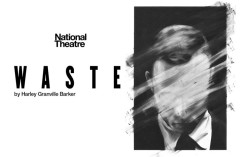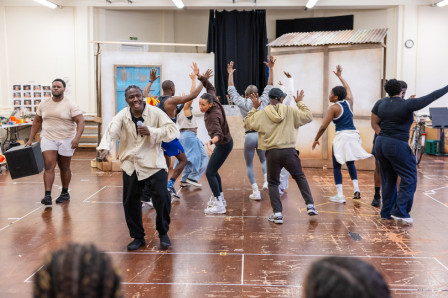Review: WASTE at the National Theatre
 There were dramatic scenes on and off stage at the National Theatre last night when an audience member in the front row suffered a suspected heart attack four minutes before the end of the press night performance, which had to be stopped so the man could receive medical help.
There were dramatic scenes on and off stage at the National Theatre last night when an audience member in the front row suffered a suspected heart attack four minutes before the end of the press night performance, which had to be stopped so the man could receive medical help.
After a short delay the stage manager announced that whilst they waited for an ambulance the patient and his family were happy for the performance to restart and conclude, so the evening’s final lines about life and death had a horrible poignancy that had us all on the edge of our seats.
Up to then it had been a “game of two halves” as they say in football commentaries to indicate varying success.
WASTE by Harley Granville Barker, one of the founders of a movement which would result in the creation of the National Theatre, was once described as the Edwardian HAMLET and you can see why. This is a long, wordy, dense play, jam packed with ripe characters and melodrama dramatising how a promising political future is ruined by a sex scandal. It’s a ghastly sex scandal too in which a woman, who nobody much likes, dies, seemingly unmourned, during an illegal abortion.
What’s truly shocking is the way no one, male or female, cares about her in their scrabble to hush things up and salvage the career and radical bill of a dashing young Westminster high flyer, Henry Trebell.
The long first half seeks to engage our sympathies with Trebell. We learn that he has no party allegiance or ambition, merely a thirst to do good and that his disastrous affair, with a rival’s wife, Amy O’Connel, is a very fleeting thing involving little affection on either side.
Olivia Williams makes Amy suitably shrill and annoying whilst Charles Edwards as Henry is a handsome, haunted and a thoroughly decent chap with his boyish floppy fringe and beautiful beige suit, wrestling with the moral and administrative obstacles which might stop his bill winning parliamentary approval.
In our current political climate it’s easy to see Henry as a sort of a good-looking Jeremy Corbin, struggling to be taken seriously and utterly dedicated to his cause. Aside from these intriguing parallels it’s a rather dry first hour or so with lots of DOWNTON ABBEY like twittering in drawing rooms, on verandas and in tasteful London offices.
After the interval things pick up with an unpromising scene in which beleaguered senior parliamentarians debate whether to throw post-scandal Henry to the wolves or to save him with various predictions offered as to the outcome of various scenarios.
Grey haired middle-aged men sat around discussing politics should be duller than dull but this long interlude grips as the group display cunning that rivals anything in contemporary White House thrillers. The moment when Henry and the husband of his dead lover meet face to face is mesmerising even as you long to remind them that a woman’s life has been lost through their callousness.
The final scenes too are shot through with raw emotion as Trebell waits for the verdict of his superiors and deals with the aftermath. This section contains one of the finest performances of the evening when Sylvestra Le Touzal as Henry’s sister blossoms from a secondary character into the emotional heart of the piece with her no-nonsense analysis of devotion, loss and alienation from the establishment.
Chocked full of clever dialogue, contentious ideas and bitter human tragedy this play is hard to chew over and fully digest, demanding great concentration from its audience, over a slow burning three hours played out on a stark set by Hildegard Bechtler that throws the characters and performances into stark relief against plain backdrops, with minimal furniture.
The cast under Roger Michell’s assured direction are terrific
Buttoned up English passion is prevalent throughout and what’s left unsaid is as vivid as the surface chatter but there are glorious moments that pack a direct, if clunky, punch. I especially enjoyed a throw-away exchange about a painting, at the end of the crisis meeting, which demonstrated that sex scandals have been at the heart of the British establishment for generations. I also appreciated a little scene in which an ambitious young bride-to be acknowledges that her only chance of achieving influence in Edwardian society is via her husband and not on her own terms.
The cast under Roger Michell’s assured direction are terrific, turning in detailed performances that reveal the foibles of an unappealing bunch through finely tuned nuance.
Although my mind was just about engaged throughout it was really only the final scenes and especially Le Touzal that captured my heart.
Latest News

 Further cast announced for UK and Ireland tour of Waitress The Musical
22 January 2026 at 11:08
Further cast announced for UK and Ireland tour of Waitress The Musical
22 January 2026 at 11:08

 Matthew Bourne's Cinderella to play festive season at Sadler's Wells
22 January 2026 at 10:33
Matthew Bourne's Cinderella to play festive season at Sadler's Wells
22 January 2026 at 10:33

 THE BOY WHO HARNESSED THE WIND - Rehearsal images released
22 January 2026 at 10:14
THE BOY WHO HARNESSED THE WIND - Rehearsal images released
22 January 2026 at 10:14

 Legally Blonde the Musical - Rehearsal images released
21 January 2026 at 14:51
Legally Blonde the Musical - Rehearsal images released
21 January 2026 at 14:51
